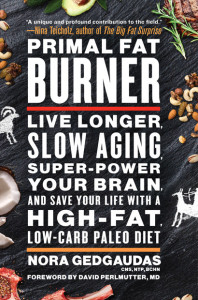
A fan asks:
“Good morning Nora, I am a 60 year old female RN in LA, I have been following your advice re: ketogenic program since May of this year with great success. Much gratitude to you. Can I stay with your suggestions indefinitely? I’ve heard a few comments about ketosis having long term negative effects. Can you guide me to book, article, other info?
My answer:
There have been one or two bloggers that have enjoyed stirring controversy in this area and have been shamelessly fear mongering about the subject of ketosis without any rational basis for doing so. I can also think of a couple of authors (who shall remain nameless here) that insist that we need carbs from time to time. This is a myth.
I’ve never seen one piece of literature— real literature (and not popular books or blogs)— that ever once suggested that full-time ketosis was in any way harmful, or that carbohydrates in any manner, shape or form have a scientifically established human dietary requirement. PERIOD.
If ever there was a political marketing ploy, this is it.
When claims are made that there is harm in full-time ketosis you always have to consider:
1) The source of this information, whether they actually have a healthcare background (or if they do) the possible personal/political/populist agenda’s someone might have for suggesting this.
2) Whether they are using mice or rat studies to make these determinations (neither animal of which are naturally physiologically designed for eating significant amounts of fat, or have anywhere near the unique capacity of humans to make full-time use of ketones).
3) You always have to consider the type of ketogenic diet being implemented. Is it starvation? Is it large amounts of canola oil (or other toxic or non-nutritional fats)? Is it a high-fat diet still containing elements such as corn syrup solids, fructose or other sources of glycemic carbs? Is it Atkins (with excessive levels of protein)? What is the quality and/or nutrient density of the food the subjects are consuming? Are GMO’s part of the picture? Crappy feedlot meat?
At least two of the authors claiming this concern have ZERO healthcare backgrounds, one other seems to be looking for carving out their own little niche market in the genre by basically telling people what they want to hear by saying that carbs are necessary from time to time. As for the bloggers I am thinking of, the so-called “science” they present is extremely shaky, as are their motives for making these claims.
I urge you to re-read my book, Primal Fat Burner (or please read it if you have not already done so) and consider the sound historical/evolutionary and physiological basis for full-time ketosis and a fat-based diet in humans, as well as the unbelievably broad plethora of evidence for its efficacy in quite literally every major metabolic and/or disease process. Why would nature design us to take advantage of such a broad range of superior benefits only “periodically”? It makes no sense. Some say it is like a vegetarian or vegan diet, where there are short-term benefits but long-term there are diminishing returns.
The difference is this: we are a species extraordinarily and uniquely well designed to make excellent and thorough use of a higher fat diet, but we lack the physiological makeup of an herbivore and really aren’t designed to make full-time or very thorough use of plants as a primary source of nourishment. Serious nutrient deficiencies and other very real problems in vegetarianism and especially veganism are entirely inevitable.
In my Primalgenic® dietary approach one can gain all of the potential benefits of eating abundant non-glycemic, fibrous plant foods without any associated down side or detriment whatsoever—while also reaping enormous longevity benefits. Also, it is possible to have a fatty acid/fat-soluble nutrient deficiency (we DO have a human dietary requirement for certain fatty acids and animal source fat soluble nutrients), but it is literally not possible to have a carbohydrate deficiency—and there is no established basis or requirement for this anywhere in medical science.
I also present evidence in my book by researchers of higher fat, ketogenic diets long-term safety in humans, with no apparent detriments. My book supplies over 300 peer-reviewed references that are readily available for your further examination. I can think of no other single reference tool that covers this topic more thoroughly, and with greater or more in-depth scientific rigor.
Finally (and more to the point), how are YOU feeling? If your health is robust and you lack symptoms, then there is really no need to question the path you are on. Sometimes populist propaganda can get us to second-guess ourselves, even when we already know better. It sounds to me like you have been doing great.
If you are still symptomatic in any way, then you need to dig a little deeper to figure out what is happening… but I promise you that an Effective State of Ketogenic Adaptation (EKA)™ while eating an extremely high quality, nutrient dense diet is NOT to blame.
I hope this helps and makes some sense to you. I could go on and on, but believe me, the case is solid.
Warmly,
~Nora




Couldn’t agree more… for most people! Just bought the book; can’t wait to read it (right after I finish Sapiens)!
Did you know that one out of every five adults in the U.S. has subclinical hypothyroidism, with various etiologies? Functional ranges of FREE T3 are 3.0 – 4.0 pg/mL. If you’re below 3.0 pg/mL, you might be hypothyroid. Would ketosis hurt ya or help ya… completely depends on why you’re hypothyroid…
For instance, if you’re hypothyroid because of stress / cortisol dysfunction, then chances are your reverse T3 (rT3) has been upregulated thus displacing free T3 (at the cellular level) in an effort to slow you down and get you recovered. Same thing happens when you get sick, or get the flu but with chronic stress, it’s never ending which is why hypothyroid is common here.
Going low carb / keto could be disastrous IF your biology perceives keto to be yet another low-grade chronic stress…. Not sleeping well is a low grade stress… Not eating well is a low grade stress… Food sensitives (especially gluten, msgs, artificial food-like products) are a low grade stress… Moving too much (or) not moving enough is a low grade stress… Danger / poison is a stress (think lions, trans fats, sugars, fluoride, excessive wifi, emfs, vaccines, mercury, non-native water, plastics, non-native clothing, non-native bedding, non-native eating and drinking containers, flame retardants, etc)… you get the picture.
For the record, I’m a huge fan of primal aligned eating and living patterns… I’ve been cycling in and out of ketosis for more than a decade, spending most of my time in keto. I am convinced that this is our default way of being and usually feel amazing. When my blood sugar starts to increase, and my libido starts to wane, that’s my queue to cycle in some carbs. Yes, this is just me… just my two cents 🙂 I’m looking forward to Primal Fat Burner… thank you for all the wonderful work that you do!
Thank you! There is so much conflicting information going around. I use your research and books as the gold standard. I am #primalgenic for life. Thank you for solid information.
Hi, I think there are views on ketosis by many who haven’t lived in it for long or who fail to get keto adapted because it’s takes dicipline to get there. Presently living in ketosis for the first time & having made this amazing discovery I don’t intend reverting if I was bribed!! Driven there by carbohydrate intolerence, digestive pain, heartburn etc. etc., (which meant for me I couldn’t give in trying to get there). Having had issues for over 20 years, I have never had so much energy & been symptom free. The joy of eating lovely fats, ghee, pork skins & moderate protein makes up for giving away carbs. In a society where we drive insulin way too much with our processed food, leading not only to weight problems but aging, wrinkles, poor teeth & so on. Being stubborn that I am I intend to live this way. The benefits are so worth it. Yes it took 6 – 7 weeks of complete lethargy, hardly being able to move while the body adjusted to using fat as it’s fuel. I am so glad to have got there, no turning back. Nora’s book was my first introduction of the concept followed by much googling. Thank you Nora.
Thank you for this! I also use your books and i information as the gold standard. I can always trust your information to be sound and to clear up any confusion. This is huge! Thank you